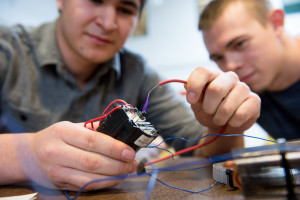Colorado State University will join Georgia Tech’s Vertically Integrated Projects (VIP) Consortium through a $5 million grant from The Leona M. and Harry B. Helmsley Charitable Trust, in an effort to drive systemic reform of STEM education.
 The VIP program unites large teams of undergraduates with graduate students and faculty to work together on long-term research projects. Under the leadership of Georgia Tech and the co-leadership of the University of Michigan, the Helmsley award expands VIP to a consortium including CSU and other schools. This gives the program a foothold in a variety of institutions across the U.S. and abroad, including those that primarily serve underrepresented, minority or nontraditional students, as well as members of the prestigious Association of American Universities.
The VIP program unites large teams of undergraduates with graduate students and faculty to work together on long-term research projects. Under the leadership of Georgia Tech and the co-leadership of the University of Michigan, the Helmsley award expands VIP to a consortium including CSU and other schools. This gives the program a foothold in a variety of institutions across the U.S. and abroad, including those that primarily serve underrepresented, minority or nontraditional students, as well as members of the prestigious Association of American Universities.
“The Helmsley Charitable Trust is thrilled to support the VIP Consortium’s transformative approach to active learning in engineering,” said Ryan Kelsey, program officer at the Trust. “It is very compelling to see such a range of engineering schools across the country that are ready to adopt large-scale, effective practices that we expect will retain more students, particularly more women and students of color.”
Program goals
The Helmsley Charitable Trust’s education program aims to increase American competitiveness and innovation. At the post-secondary level, it focuses on increasing the number and diversity of college graduates in STEM fields by improving persistence to graduation.
VIP offers an ideal setting for rethinking STEM education, because it attracts students of various ages, interests and experiences together for ongoing work. VIP projects can last a decade or more, and undergraduates may spend up to three years with their project teams.
“For many students, this is the first chance they’ve had to do something real while they’re undergraduates,” said Edward Coyle, Arbutus Chair for the Integration of Research and Education at Tech, and the VIP Program’s founder and director.
Thanks to VIP, some students may feel more comfortable sticking with STEM fields and pursuing them after college. The organizers wrote in their Helmsley grant proposal that the program “can create the sense of belonging and pride of accomplishment that motivates students to persist through other elements of the STEM curriculum.”
Edwin Chong, professor of Electrical and Computer Engineering and Mathematics and director of the CSU Information Science & Technology Center (ISTeC), is the director of VIP at CSU.
“The VIP program at CSU will enhance our research and educational missions by bringing students from different stages and disciplines into integrated projects,” Chong said.
Participants
The VIP consortium consists of 15 public and private institutions, including two universities abroad: National Ilan University in Taiwan and the University of Strathclyde in Scotland. The 13 participating U.S. universities are:
- Georgia Tech
- University of Michigan
- Purdue University
- Texas A&M
- Rice University
- University of Washington
- Howard University
- Morehouse College
- Florida International University
- Boise State University
- Colorado State University
- University of Hawaii-Manoa
- Virginia Commonwealth University
“Our undergraduate students need more hands-on experience, and our graduate students need mentoring experience,” said CSU ESS-Watershed Science Professor and Associate VIP Director Steven Fassnacht, who is also heading a VIP Team examining the variability of snow. “The VIP program will help address these needs.”
For more information, visit http://vip.colostate.edu/.